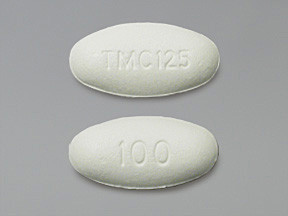ETRAVIRINE - ORAL
PHONETIC PRONUNCIATION: (et-ra-VIR-een)
COMMON BRAND NAME(S): Intelence
GENERIC NAME(S): etravirine
Uses
USES: Etravirine is used with other HIV medications to help control HIV infection. It helps to decrease the amount of HIV in your body so your immune system can work better. This lowers your chance of getting HIV complications (such as new infections, cancer) and improves your quality of life. This medication is usually prescribed to people who have taken other HIV medications (e.g., efavirenz, nevirapine, delavirdine) that did not work well enough to control their HIV. Etravirine is known as a non-nucleoside reverse transcriptase inhibitor (NNRTI). It blocks the virus from growing and infecting more cells. Etravirine is not a cure for HIV infection. To decrease your risk of spreading HIV disease to others, do all of the following: (1) continue to take all HIV medications exactly as prescribed by your doctor, (2) always use an effective barrier method (latex or polyurethane condoms/dental dams) during all sexual activity, and (3) do not share personal items (such as needles/syringes, toothbrushes, and razors) that may have contacted blood or other body fluids. Consult your doctor or pharmacist for more details.
How to use ETRAVIRINE - ORAL
HOW TO USE: Read the Patient Information Leaflet provided by your pharmacist before you start using etravirine and each time you get a refill. If you have any questions, consult your doctor or pharmacist. Take this medication by mouth after a meal as directed by your doctor, usually 2 times daily. Swallow the medication whole. Do not crush, chew, or split the tablets. In children, the dosage is based on weight. If you have trouble swallowing this medication whole, you may place your dose in a glass with about 1 teaspoonful (5 milliliters) of water to dissolve the tablet. If needed, add more water to cover the tablet. Stir the mixture well until it looks milky. Use only water to dissolve the tablet before adding other liquids. You may then add a small amount of water, orange juice, or milk to the glass and drink all of it right away. Rinse the glass with more water, orange juice, or milk and drink all of it. Rinse and drink several times to make sure you have taken the whole dose. The manufacturer says you should not mix the drug with grapefruit juice, or with warm or carbonated drinks. It is very important to continue taking this medication (and other HIV medications) exactly as prescribed by your doctor. Do not increase your dose or take this medication more often than prescribed. Your condition will not improve any faster, and the risk of serious side effects may be increased. Do not take less of this drug than prescribed or stop taking it (or other HIV medicines) even for a short time unless directed to do so by your doctor. Doing so may cause the amount of virus to increase and/or make the infection more difficult to treat (resistant). For the best effect, take this medication at evenly spaced times. To help you remember, take this medication at the same times every day.
Side Effects
Precautions
Interactions
Overdose
Images
Reviews
Faq for ETRAVIRINE - ORAL
Etravirine is an oral medication that belongs to a class of drugs known as non-nucleoside reverse transcriptase inhibitors (NNRTIs). It is used in combination with other antiretroviral medications to treat HIV infection.
Etravirine works by blocking the activity of reverse transcriptase, an enzyme that HIV uses to multiply and infect new cells. By inhibiting reverse transcriptase, etravirine helps to reduce the amount of HIV in the blood and slows down the progression of the infection.
Etravirine is used to treat HIV-1 infection in adults and children above the age of six. It is usually prescribed for individuals who have developed resistance to other antiretroviral medications or are experiencing treatment failure.
Etravirine is taken orally in the form of tablets. It is usually taken twice a day, with or without food. It is important to take etravirine as prescribed by your doctor and not to skip or miss doses.
Common side effects of etravirine may include rash, nausea, vomiting, diarrhea, headache, tiredness, and abnormal liver function tests. These side effects are usually mild and go away on their own. However, if they persist or worsen, it is important to inform your doctor.
Serious side effects of etravirine are rare but can occur. These may include severe skin rash, liver problems, allergic reactions, and changes in fat distribution (lipodystrophy). If you experience any severe or persistent side effects, it is important to seek medical attention immediately.
Yes, etravirine can interact with certain medications, including other antiretroviral drugs, certain antibiotics, antifungal medications, and medications used to treat seizures. It is important to inform your healthcare provider about all the medications you are taking to avoid potential drug interactions.
Etravirine is classified as a pregnancy category B drug, which means it is generally considered safe to use during pregnancy. However, it is important to discuss the potential risks and benefits of using etravirine with your doctor if you are pregnant or planning to become pregnant.
No, etravirine cannot cure HIV infection. It is part of a lifelong treatment regimen to manage HIV and reduce the viral load in the body. It is important to continue taking etravirine as prescribed by your doctor, even if you feel well and have no symptoms.
Disclaimer
IMPORTANT: HOW TO USE THIS INFORMATION: This is a summary and does NOT have all possible information about this product. This information does not assure that this product is safe, effective, or appropriate for you. This information is not individual medical advice and does not substitute for the advice of your health care professional. Always ask your health care professional for complete information about this product and your specific health needs.



No Reviews Yet